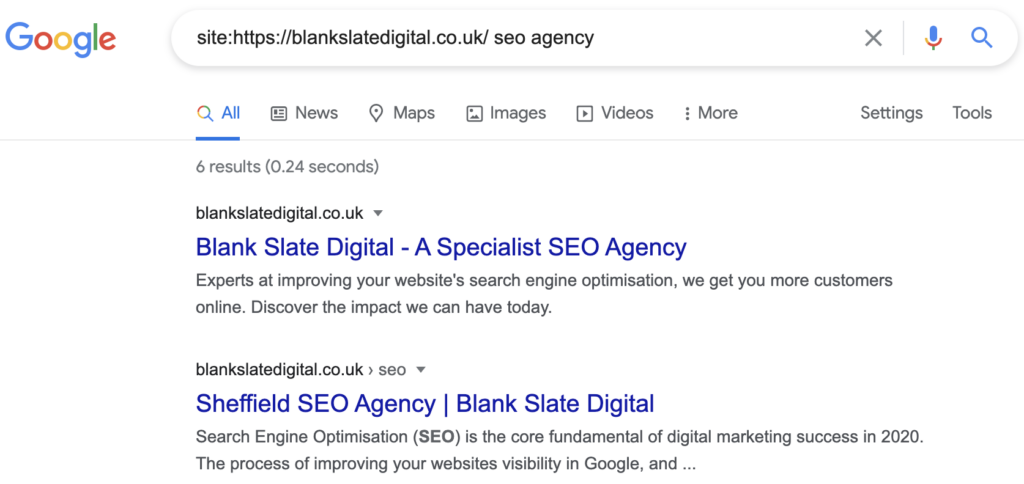Keyword cannibalisation is a term used in search engine optimisation to describe multiple pages from the same website that rank for the same search queries.
If you optimise multiple blog posts or pages on your site to target similar terms, your rankings might suffer as you will be competing with yourself in search engine results pages. Keyword cannibalisation typically occurs when multiple pages cover a topic that is too similar or, that the pages were optimised for the same key search term.
Typically, Google will only show 1, possibly 2, result from the same domain for a given query, depending on the authority of the domain.
If your website has been around for a few years, chances are you have a couple of pages that are affected by keyword cannibalisation.
Why is it bad for SEO?
From the untrained eye, it might seem like a good thing to have more than one of your website’s pages ranking for a given term, but in SEO, if you cannibalise your keywords you are essentially competing with yourself.
If you have two pages or blog articles that talk about the same topic, search engines will not be able to determine which one of the pages should rank highest for a given search query. As a result of this, the chances are that both posts will suffer and collectively rank lower than just one optimised article would.
In addition to this, having two or more articles will dilute other important SEO factors like backlinks and click-through rates. So before creating a new blog post, ensure that you have checked that no posts on your site already rank for the targeted terms, by taking a look in your favourite keyword tracking software or Google Search Console.
How to check for keyword cannibalisation
Checking for instances of keyword cannibalisation on your website is far simpler than you might think by using Google search operators. Simply perform a Site: search including the URL of your website.
As an example, I will perform this on the Blank Slate Website, looking for instances where multiple pages might be competing for ‘SEO agency’

As you can see, both the homepage and seo pages are showing, in this instance, this is what I would expect to see as I have mentioned that keyword on both the content of the pages as well as in the metadata. To solve this cannibalisation, I have chosen to tweak the content and meta for the homepage to ensure /seo is the main focus page for that given keyword.
How to fix keyword cannibalisation
In most cannibalisation cases, it is necessary to merge and delete content. There are 4 main steps to follow when fixing cannibalisation issues using this method on your website;
- Audit the content
- Analyse performance of the affected pages
- Decide what action should be taken
- Change or merge the content, and if applicable, delete the old page and redirect to the chosen keeper
Merge the pages
If you have identified 2 pages on your site that attract the same audience and target the same keywords, the best action is to merge them. This will help the overall rankings and visibility of the kept page as the longer, and better-written content of one page will outperform the 2 separate pages that were present beforehand.
Simply download the content of the 2 affected pages, merge the content and pad it out anywhere you can to improve the overall readability and length of the page.
Once this has been done, simply upload the new content to the URL that was chosen to keep, and delete the old page, setting up a 301 redirect to the new page and updating any links that you might have to the old URL.


